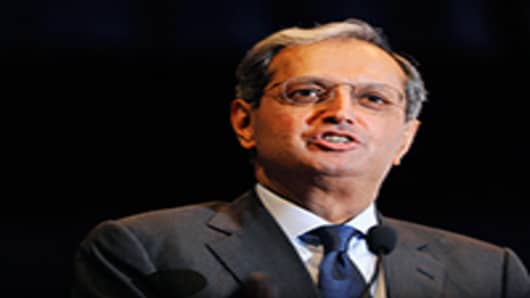Now that shareholders have a "Say on Pay," they're getting the C-suite's attention. The rule, implemented in 2011 as part of the Dodd-Frank Act, gave shareholders of public companies a nonbinding vote on executive compensation. But "nonbinding" doesn't mean "nonthreatening."
Two proxy seasons later, empowered shareholders have helped drive board members from their seats and CEOs from their perch in a string of companies, including Citigroup, Yahoo, and Avon .
In response, board members are upping their efforts to please.
"Companies see that it serves them to be more forthcoming with shareholders," said Jim Kroll, senior consultant at Towers Watson human resources consultancy. "You've got to step up your game in terms of response to shareholder votes. Companies are not being complacent."
Capitalizing on "Say on Pay" success, shareholders increased proxy contest activism and so-called "Vote No" campaigns against directors in 2012, according to Institutional Shareholder Services (ISS) research. These efforts are not being ignored.
"We're seeing a significant increase in the boards' engagement with us because of the 'Say on Pay' vote result. The attention on executive comp has boards trying to show they are accountable. That's why there's a lot of momentum behind board declassification," said Glenn Booraem, Vanguard's head of proxy voting and corporate governance. Vanguard is an index fund management firm ranking among the largest holders in hundreds of companies.
A "declassified" board member is subject to annual re-election, whereas a classified board member serves a three-year term. As more and more S&P 500 firms switch to annual elections, shareholders have gained more leverage.
"We see independent board members as our elected representatives and vote accordingly," said Anne Sheehan, director of corporate governance for CalSTRS, the California State Teachers' Retirement System. "A 'vote no' against a director is a very powerful tool for shareholders."
In many cases, this "tool" is behind major management shakeups. Take, for example, Vikram Pandit's abrupt exit as CEO of Citigroup. In April, shareholders voted against Pandit's pay package — sending a clear negative message to Citigroup's board. Then-Chairman Richard Parsons said he took the vote "seriously." By October, Pandit was out.
"Citi's 'Say on Pay' vote weakened the bonds between the CEO and the board members," said Patrick McGurn, special counsel to ISS. "If you have a spotlight cast on you as having weakened support from investors, you're likely to see a change at the top."
Overall, the vast majority of public companies still receive strong support from shareholders. The likely targets are ones with sustained poor performance. About half of the "failed" votes on compensation stemmed from companies with "double-digit negative three-year total returns," according to the ISS 2012 Proxy Season review.
In other words, "The best defense is a high stock price," said Aeisha Mastagni, investment officer at CalSTRS. Citigroup isn't alone. Other high profile coups sent a similar message.
An ailing stock price came long before hedge fund manager Dan Loeb waged a proxy fight at Yahoo. Activist investor Bill Ackman successfully ousted the CEO of Canadian Pacific Railway on grounds of underperformance. Remember the Avon lady? Dwindling profitability claimed Avon CEO's Andrea Jung's post after 13 years at the helm.
These management overhauls required shareholder support, and each shuffled boardroom seats — to either the improvement or detriment to the company. Either way, a kind of ripple effect has been cast, causing boardrooms to wage shareholder outreach campaigns of their own — before activist hedge funds, or ambitious outsiders like Carl Icahn of corporate takeover fame get to them first.
"Companies are more willing to speak directly to shareholders now. Why not speak to them ahead of the (annual general meeting) vote? They're addressing concerns to avoid a 'no' vote," said Towers Watson's Kroll.
Boardrooms are more responsive to shareholders than ever, according to Vanguard and CalSTRS, who are on opposite sides of the spectrum in terms of the size of their stakes. Both say their letters are being answered, and their phone calls taken in advance of annual general meetings. Notable, both also cite executive compensation as the most frequent issue "driving the discussions" over the past several years.
The reason for this, says ISS' McGurn, is that a disconnect between pay and performance is "a canary in the coal mine." The bird's last breath is a first sign of danger that oxygen is running out. If share prices and executive performance are out of sync, he contends, that it's an indicator of bigger problems, which shareholders are quick to detect.
Boardrooms are responding materially. "Things like gross-ups and guaranteed bonuses weren't aligned with shareholders' interests, and caught our attention. A lot of companies have changed this," said CalSTRS' Mastagni.
A company's choice to reimburse a chosen employee for a portion of taxes paid on income is the practice of so-called "gross-ups." It is a controversial carrot.
These and other shareholder irritants are occurring less and less, while boardrooms are communicating more and more — which they're doing with good reason.
"Institutional investors are much more willing than ever before to oppose sitting CEOs or chairs of the board. Pressure is now higher than ever before on companies to keep returns high," McGurn said.
Unchecked pay packages, boardroom cronyism and indulgent acquisitions are phrases more commonly associated with the 1990s bull market. Corporate governance is now having its heyday, and today's shareholders are making sure it stays that way.




